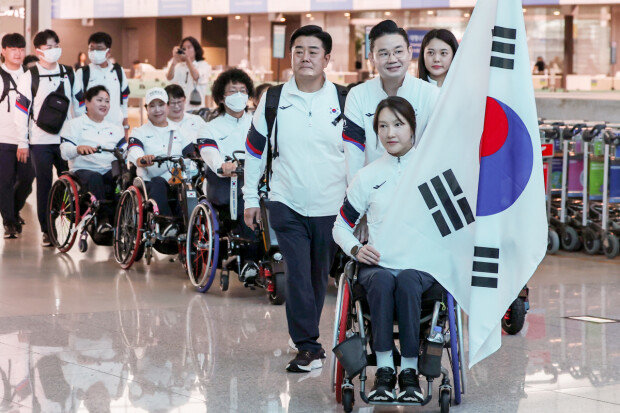Paralympics is not a stage for overcoming disabilities
Paralympics is not a stage for overcoming disabilities
Posted August. 31, 2024 15:16,
Updated August. 31, 2024 15:45

"Overcoming disabilities." This phrase often appears in media coverage during the Paralympic Games. While many readers feel "inspired" by such narratives, many also express frustration or anger. Recently, the Korea Paralympic Committee (KPC) advised media outlets to avoid using the phrase "overcoming disabilities" in their coverage of the upcoming Paris Paralympics.
When a recommendation is made to avoid certain language, it’s usually accompanied by a suggestion for what to use instead. In this case, the KPC suggested using the phrase "acquiring a disability." Typically, we use the word "acquire" to describe gaining something positive, which makes this recommendation seem unusual at first glance.
Many people without disabilities view disability as a failed status, akin to how one might describe a "communication failure." As a result, when a person with a disability achieves something remarkable, it is often framed as if they had to "overcome" their disability to do so, reinforcing the notion that disability is something to be conquered.
However, people with disabilities see it differently. For them, disability is simply a characteristic that a person might acquire during their life journey. Just as people have different races or genders, there are disabled and non-disabled people. Thus, when they hear phrases like "overcoming disability," it feels as jarring as a racially or gender-biased statement.
One Paralympic athlete put it succinctly: "When articles cover a gymnast who is 142 cm tall, there’s rarely any discussion about why this athlete is shorter than others. Similarly, stories about exceptionally tall basketball players don’t always delve into what they ate to grow so tall. But in articles about athletes with disabilities, the story of how they acquired their disability is almost always included. Why?"
"When I’m out on the street, elderly people often hand me money as they pass by. An older athlete once told me, ‘You’re not truly part of the wheelchair community until you’ve received at least 1 million won in donation,” said the athlete, who uses a wheelchair. “I understand their intentions are good, but I can’t help thinking, ‘Why should I, as a national team's athlete, be the object of pity?’"
For similar reasons, articles about the Paralympics often turn into tales of heroism or melodrama. It seems there’s an unwritten rule that these stories must be more dramatic and heroic as if to fulfill a narrative of overcoming adversity that will move readers to tears.
Some might ask, "What remains of Paralympic sports if you take away the emotional impact?" To that, I would counter, "In what field are you among the top ten in the world?" Just as most non-disabled people are ordinary neighbors, most people with disabilities aspire to be the same. Paralympic athletes do not train to inspire non-disabled people; they train for the same reasons any athlete does—for the love of sport, the joy of competition, and the pursuit of excellence.
Disability is not something that needs to be overcome. What truly needs to be overcome is the perspective that views disability as something to be conquered.
Kyu-In Hwang kini@donga.com
Headline News
- N. Korea reveals HEU production facility for the first time
- Kimpo Airport suffers another Leak, just two weeks after repairs
- Court: First Lady’s brokerage accounts used for stock price manipulation
- Trump’s lies about immigrants eating dogs instigate bomb threat
- India’s first major leaguer Roker puts on ‘7K show’ in debut







